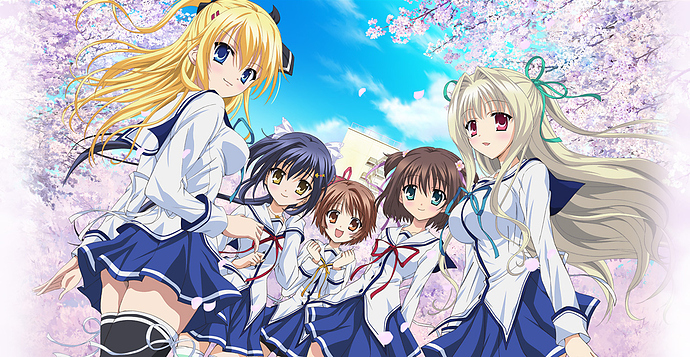For those unsure what exactly we’re supposed to talk about here…
It all started in the chat when @Mogaoscar said
A boring personal opinion brought to you by mogaoscar with 0 potential to be expanded into an interesting post.
In the beginning, it was about why certain heroine types were more popular than others, like Kouhai vs. Senpai. Why do certain types appeal more to a certain audience?
Then it shifted to tropes, common practices and why they are still common.
For example, a typical galge route goes like this:
meet girl → learn about her problem → help her solve her problem while getting closer → conclusion
So essentially, the protag would take advantage of a heroine’s weakness while proving his worth. What other approaches could be taken for a romantic relationship to begin and develop? And how about switching the roles: Making a protagonist with a problem which is the center of a route plot and having the heroines help him solve it?
Is there a way of making a galge that’s more respecting of women, for example by changing up the typical basic galge structure of heroines being “offered” to a consumer to fulfill certain expectations?
What other characteristics and tropes of galge do you think would make for a refreshing experience if changed and how exactly would you go about it?
Oh, and most of the things we discuss here could probably also apply to otome games. (I just can’t say for sure since I have no experience with those)
In case of “solving problems to get closer”, what bothers me is the feeling that you have to take advantage of someone’s weakness to win them over. This impression was particularly strong to me in the “The World God Only Knows” Manga/Anime, which is based on galge tropes. That impression would also make you conclude that if you can’t find out the exact thing a person needs and offer it to them, how can you ever become noteworthy, let alone special to someone?
But finding an alternative approach seems tricky, since “solving problems” is very effective in several ways. It creates a storyline, gives the characters a challenge to overcome, a reason to experience a wide range of emotions. It builds (or ruins) trust, encourages character development, reveals traits they’d rather keep hidden, etc. It simply accelerates all kinds of changes that you want to display in an interpersonal relationship which you want to show to your audience.
Without it, you’d have to take things more slowly. Build up a relationship with small, less emotional interactions. A common dating sim mechanic (I think?) is accumulating affection points by choosing the “right” dialogue options. Just make sure not to make the options polar opposites of each-other (like “soup is the best food” vs. “soup is the worst food”) - that would make the protag look either insincere or simply devoid of personality. But these small events usually already happen in the common route, so you need to up the ante, offer something more exciting…
To be honest, I’m kinda running out of ideas for an elegant solution right now 

